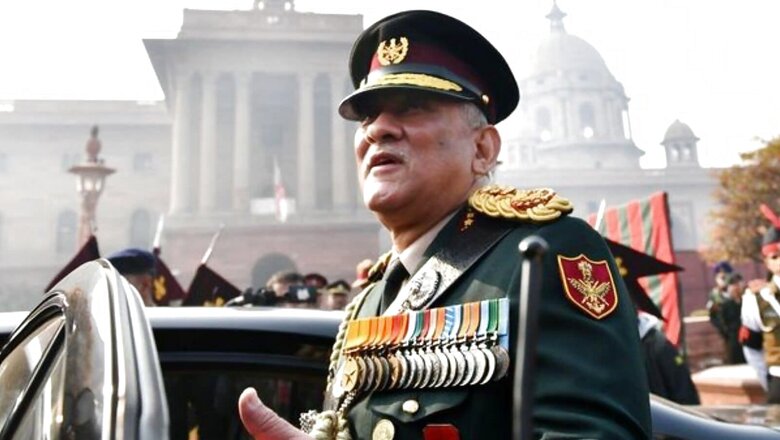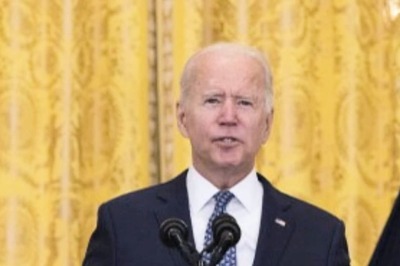
views
It’s exactly two months since India’s first Chief of Defence Staff (CDS) General Bipin Rawat died in a tragic helicopter crash near Tamil Nadu’s Coonoor, along with his wife and 12 other Armed Forces personnel.
Sixty days have gone by post the accident on December 8 and the government seems to be in no rush to appoint Gen Rawat’s successor, even as whispers in the power corridors suggest a decision on this front by April this year.
But in the interim, even as rumour mills flow to throw new names at a clueless audience waiting to guess the next CDS, the government should first look at tying some loose ends and put out certain key aspects in black and white before taking a call on the next CDS. And doing this seems just prudent with the extra time the government is taking to decide on a final name for the post.
But before getting into what exactly they are, let’s quickly glance at this timeline.
The chronology
That India will have a CDS was announced by Prime Minister Narendra Modi from the ramparts of the Red Fort on August 15, 2019.
But what followed in the next few months was a heady mix of suspense and confusion; suspense about who would be made the first CDS of the country among the spotlighted contenders. Confusion about what exactly would be the CDS’s charter and seniority in what was an established defence architecture, with defined work cut out for the three service chiefs and the union defence secretary.
There was some clarity when the government announced Gen Rawat as India’s first CDS, around the time he was to retire as the Indian Army chief, after a successful tenure. But newer questions cropped up as well.
Many of them still do not have a definitive answer, irrespective of the government’s amendments to the Government of India (Allocation of Business) Rules, 1961, for the defence ministry, which transferred some subjects of the defence secretary-headed Department of Defence (DoD) to the newly carved CDS-headed Affairs (DMA) but also introduced new subjects for the former.
Change of course
For instance, powers of revenue procurements rest with the DMA, while capital procurements and defence budget are a subject of the DoD. But in the backdrop of budgetary constraints, the CDS has to carry out inter-services prioritisation on major big-ticket capital procurements.
The government should look at strengthening the Acquisition Wing of DoD to speed up the conclusion of major contracts, and as the DMA evolves, it can be delegated more powers to modernise the Armed Forces.
Another critical area that demands clarity is defence policy — a subject formally introduced in the 2019 amended Allocation of Business Rules and put under the DoD.
Defence policy, in its current vague and undefined form, can practically govern everything — from procurement to research to the personnel matters of the Armed Forces.
For example, the updated version of the defence procurement manual — the guiding book governing all revenue procurements — had been finalised by the DMA, but is undergoing fresh rounds of vetting by the DoD since defence policy comes under it.
It is high time that instead of leaving something as vast as defence policy undefined, the government provides greater clarity to it before it appoints the next CDS.
This could entail several layers. Ideally, every department, whether it is defence research or DMA, should be solely responsible for policies on issues that are directly related to their department.
Certain policies which may have a bearing on more than one subject which are governed by more than one department in the defence ministry can be put under the DoD for a neutral and rounded view.
Defining seniority for better civil-military relations
The last and a critical aspect which the government must look into, before appointing the CDS, is to define in clear terms the first-among-equals among all secretaries in the defence ministry.
The government did not make the CDS a five-star rank. That would have made him senior to the cabinet secretary of India, who’s the senior-most bureaucrat of the country.
However, the CDS is the chairman of the Chiefs of Staff Committee, which effectively makes him first-among-equals among the service chiefs, who are four-star military officers and senior to all secretaries heading various departments in defence ministry. But the CDS is also the secretary of DMA, which is one of the departments of the ministry.
While it is understandable that the structure of DMA will further evolve and concretise in the coming years, defining the exact seniority at this point will go quite some way in resolving any civil-military power tussle that may arise in the defence ministry.
What might be added to this is to open up senior bureaucratic positions in DMA to the civil side and those in other defence ministry departments to the military side to meet a defined ratio between the two sides.
The government had, in the past, tasked other departments in the defence ministry to handhold the DMA so that it can produce optimal results of the tasks which it has been allocated under the amended rules.
While the CDS was actively involved in establishing jointness among the Armed Forces and in paving the way for the creation of theatre commands, the DMA was vested with heavy responsibilities under the amended rules, such as the Armed Forces of the union, the Integrated Defence Headquarters of the Defence Ministry, the Territorial Army and works relating to the three services.
It’s high time the government sets a defined deadline for this handholding exercise so that the DMA, under the new CDS, can achieve the maximum of the tasks allocated.
But this again rests on lesser friction in civil-military relations, which in turn rests on the government who should provide greater clarity on the roles and seniority of all positions involved.
Read all the Latest India News here



















Comments
0 comment